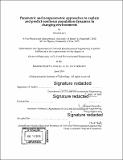Parametric and nonparametric approaches to explain and predict nonlinear population dynamics in changing environments
Author(s)
Cenci, Simone.
Download1129586419-MIT.pdf (23.99Mb)
Other Contributors
Massachusetts Institute of Technology. Department of Civil and Environmental Engineering.
Advisor
Serguei Saavedra.
Terms of use
Metadata
Show full item recordAbstract
Many aspects of human societies, from the sustenance of national economies to the control of population health, depend on the dynamics of biological populations within a given environment. Therefore, understanding and predicting the effects of changing environments on the dynamics of biological populations evolving in a continuously changing world is, nowadays, one of the most important challenges in biology. In this thesis we have addressed this challenge using two different approaches. The first approach, called the structural approach, is deductive, i.e., the effects of changing environments on population dynamics are studied using parametric models under equilibrium assumptions. In this context, firstly we have shown that, while the approach was originally introduced to investigate the structural stability of the classic Lotka-Volterra dynamics; it can be applied to a much larger class of nonlinear models and to stochastic systems. Then, we used the approach to analyze empirical data to investigate how structure and dynamics of species interactions regulate species coexistence under fast environmental changes. The generalizability of this approach however, has been limited because equilibrium dynamics are seldom observed in nature and exact equations for population dynamics are rarely known. Therefore, in the second part of the thesis we took an inductive approach. Specifically, we proposed a nonparametric framework to estimate the tolerance of nonequilibrium population dynamics to environmental variability. To apply the framework on empirical data we have improved/developed nonparametric computational methods to infer biotic interactions and their uncertainty from nonlinear time series data. Using our approach we were able to recover important ecological insights without the explicit formulation of parametric models. That is, we have shown that it is possible to build ecological theories inductively from observational data with minimal assumptions on the data-generating processes. Overall, we believe that the increasing amount of biological data available nowadays paves the way for moving theoretical population biology from being a deductive, assumption driven science towards an inductive data-driven science. In this context, this study is a step forward towards the foundations of a nonparametric data-driven research to monitor and anticipate the response of populations to the increasing rate of environmental changes.
Description
Thesis: Ph. D., Massachusetts Institute of Technology, Department of Civil and Environmental Engineering, 2019 Cataloged from PDF version of thesis. Includes bibliographical references (pages 195-211).
Date issued
2019Department
Massachusetts Institute of Technology. Department of Civil and Environmental EngineeringPublisher
Massachusetts Institute of Technology
Keywords
Civil and Environmental Engineering.